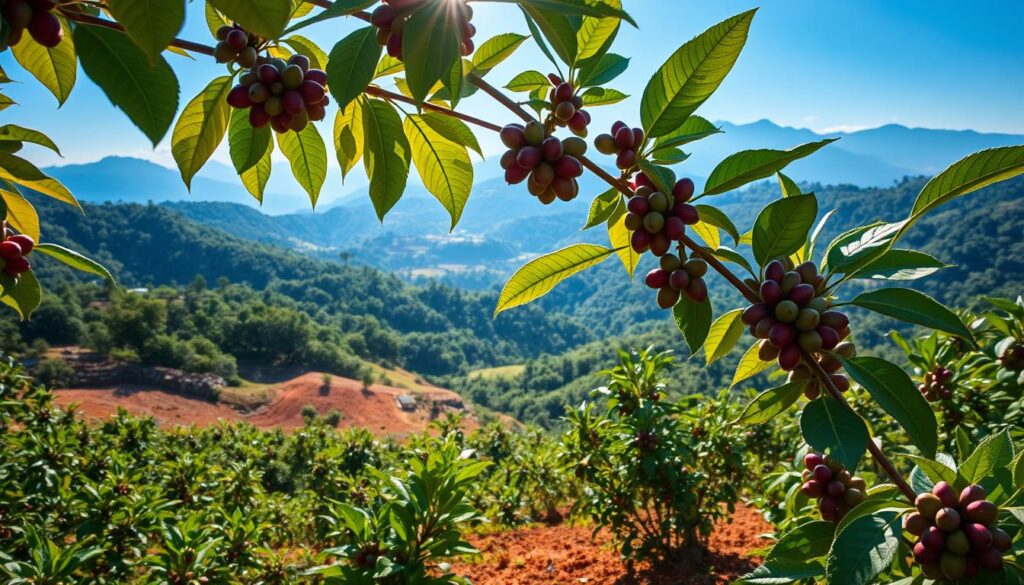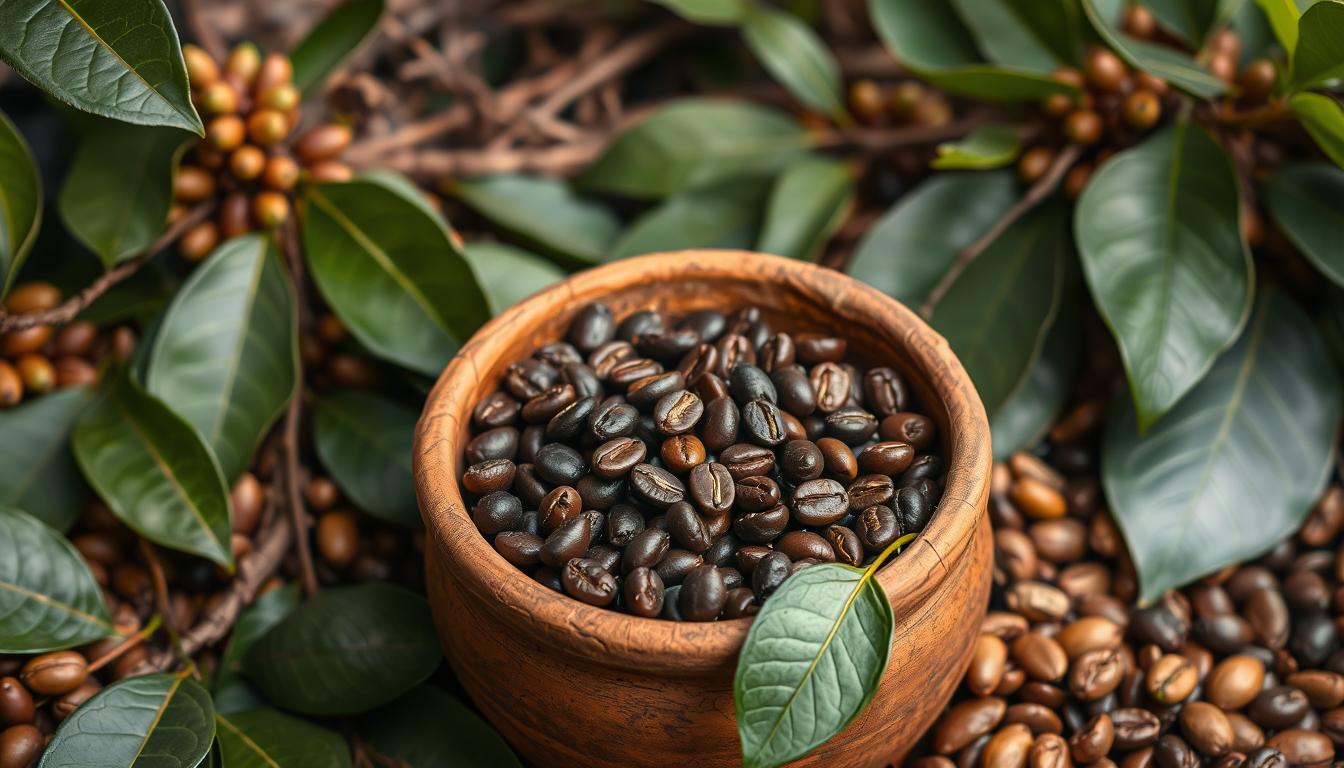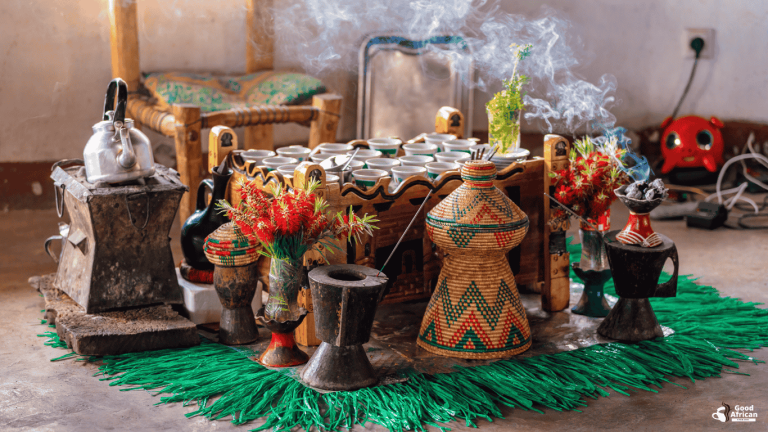Imagine walking into a cozy cafe, where the smell of coffee fills the air. It takes you to Ethiopia’s green highlands. Known as the “Birthplace of Coffee,” Ethiopia has been making top-notch coffee for centuries. The secret to its great taste is the country’s special land, old farming ways, and careful coffee-making steps.
So, why is Ethiopian coffee so special? It’s because of many things that come together. The high places where most coffee grows slow down the beans’ ripening. This lets them get richer flavors. The warm weather and rich soil in these areas also make the beans unique.
Key Takeaways
- Ethiopian coffee is famous for its top quality and special tastes.
- The high places, warm weather, and rich soil in Ethiopia’s coffee areas are perfect for growing coffee.
- Old farming ways and careful coffee-making steps make Ethiopian coffee taste and smell amazing.
- Ethiopia is a big coffee maker in the world, producing over 400,000 metric tons every year.
- The different places where coffee grows in Ethiopia offer a wide range of tastes, from floral and fruity to complex and bold.
The Rich History of Ethiopian Coffee
Ethiopian coffee has a legendary story and a rich culture that fascinates coffee lovers everywhere. It is the birthplace of coffee, with a history over a thousand years old. Its aromatic beans are key to the global specialty coffee scene.
Origins of Coffee in Ethiopia
A goatherd named Kaldi discovered coffee. He noticed his goats got energetic from eating coffee berries. This chance find spread coffee across the region and the world.
By the 15th century, Ethiopia was sending coffee to Yemen. This started coffee’s journey around the globe. Today, Ethiopia is a top coffee producer, known for its diverse beans and flavors.
Cultural Significance of Coffee Ceremonies
Coffee is a big part of Ethiopian culture. Traditional coffee ceremonies are a big deal, lasting 2-3 hours. They involve roasting, grinding, and brewing coffee beans.
These ceremonies are social events where families and friends enjoy the coffee. It’s served without milk, sometimes with sugar. The ceremony has three rounds of brewing, each weaker but just as important.
This tradition shows how much Ethiopians value their Ethiopian coffee history and culture. It highlights the importance of coffee in their lives.

“Coffee is the common man’s gold, and like gold, it enriches the person who possesses it.” – Sheik Abd-al-Kadir
Unique Growing Conditions
Ethiopia’s coffee-growing regions are known for their exceptional quality. The high-altitude climate and fertile soil are perfect for growing top-notch coffee beans. This combination makes Ethiopian coffee stand out.
Altitude and Climate Factors
Ethiopian coffee plants love the cool, sunny weather and rich soil found at high altitudes. The slower growth of coffee cherries at these heights leads to more complex flavors. This results in Ethiopian coffee’s bright acidity, fruity notes, and smooth body.
The Role of Diverse Coffee Varieties
- About 80% of Ethiopia’s coffee comes from different Arabica bean varieties, each with unique traits.
- The small, dense coffee beans from Ethiopia’s high-altitude regions have a smooth, glossy look and complex flavors.
- Places like Sidamo and Yirgacheffe are famous for their coffee with citrus, berry, and floral flavors.
Ethiopia’s coffee-growing areas have diverse microclimates and soil conditions. This diversity leads to coffee with exceptional quality and unique flavors. It shows how remarkable the growing conditions are for Ethiopian coffee.

Distinct Flavor Profiles
Ethiopian coffee is known for its complex flavors. These come from the country’s varied growing areas, high altitudes, and how the coffee is processed. Its flavors often include bright, fruity, and floral notes, loved by coffee lovers everywhere.
Tasting Notes of Ethiopian Coffee
Ethiopian coffee often tastes like citrus fruits, such as bergamot and lemon. It also has berry-like flavors, like blueberry and blackberry. Some Ethiopian coffee smells like jasmine or lavender, with a crisp acidity and a smooth finish.
Factors Influencing Flavor
Many things shape Ethiopian coffee’s flavors. The growing region, coffee type, and processing method all play a part. For example, Sidamo coffee might taste floral and citrusy, while Yirgacheffe coffee has berry and chocolate notes. How the coffee is processed, like wet or dry, also affects its taste.
“The high genetic diversity of Ethiopian coffee plants contributes to the wide range of flavors found in the country’s beans.”
Ethiopia grows many coffee varieties, including heirloom and indigenous ones. This diversity makes Ethiopian coffee’s flavors complex and unique. It offers a wide range of Ethiopian coffee flavor profiles, from delicate floral to bold and full-bodied.
The Global Impact of Ethiopian Coffee
Ethiopian coffee has greatly influenced the world of specialty coffee. Its unique taste, with floral and fruity notes, has won over coffee lovers everywhere. The high-altitude farms in Ethiopia create the perfect conditions for growing these exceptional beans.
Contribution to the Specialty Coffee Market
The journey of Ethiopian coffee as a specialty began in the 1930s with the first cooperative. It quickly gained popularity in the US, becoming a favorite among coffee lovers. Today, Ethiopian coffee is known as one of the finest in the world, with Yirgacheffe being a top choice.
Sustainable Practices in Ethiopian Coffee Farming
Ethiopian coffee farms often use sustainable methods. They grow coffee in natural, shaded areas without chemicals. This approach meets the growing need for eco-friendly and ethically sourced coffee. The industry supports many small farmers and boosts Ethiopia’s economy, with half of its coffee going to international markets.







